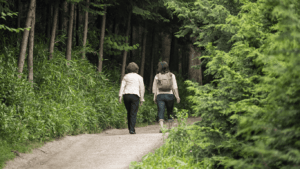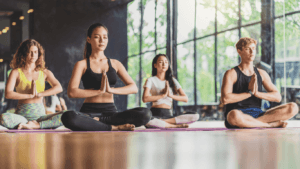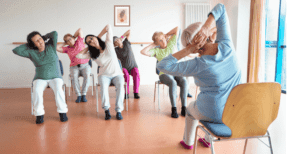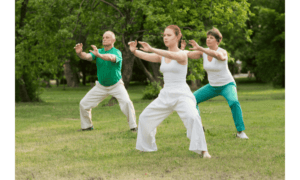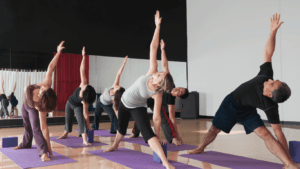Sleep is a cornerstone of good health, much like eating well and staying physically active. It restores both the mind and body, helping us retain memories, regulate emotions, and maintain a healthy immune system. However, a large number of people are struggling for sufficient quality sleep- pressures of modern life, irregular schedules, chronic stress, and excessive screen time—are the key factors. About 50 to 70 million Americans have sleep disorders, and 1 in 3 adults (about 84 million people) do not regularly get the recommended amount of uninterrupted sleep they need to protect their health. Chronic sleep deprivation doesn’t just leave us feeling groggy the next day; it’s also linked to serious health risks, including heart disease, stroke, and depression, necessitating measures including use of sleep aids and gadgets.
If getting enough rest were as simple as just lying down, these health concerns wouldn’t be so widespread. Restful sleep, however necessitates intentional effort and use of the right tools. Today, there’s a growing market of evidence-based sleep aids and gadgets, designed to improve how long and how well we sleep. From herbal remedies and melatonin supplements to cutting-edge light therapy devices, these solutions offer something for everyone and everything for someone.
This article serves as a detailed guide to the best science-backed sleep aids and gadgets available. From the light sleepers, and those struggling with insomnia, to the ones who just want to improve nightly rest, these guidelines will help you wake up refreshed and ready to take on the day.
Understanding Sleep
Sleep Cycles and Stages
Sleep is more than just turning off for the night—it follows a complex pattern divided into four distinct stages, each crucial to our overall well-being. The body cycles through these stages several times throughout the night, with each cycle lasting about 90 minutes.
Stage 1 – Light Sleep
This brief phase marks the transition from wakefulness to sleep. During this time, your breathing slows, your muscles begin to relax, and your brainwaves shift to a slower rhythm.
Stage 2 – Deeper Light Sleep
In this stage, which makes up about 50% of your total sleep, your heart rate decreases, and your body temperature drops. It’s also when the brain produces sleep spindles, short bursts of electrical activity linked to memory consolidation.
Stage 3 – Deep Sleep (Slow-Wave Sleep)
Also called restorative sleep, this stage allows the body to heal, repair tissues, and boost the immune system. If someone wakes up from deep sleep, it can leave them feeling groggy and disoriented due to sleep inertia.
Stage 4 – REM Sleep
REM (Rapid Eye Movement) sleep is associated with dreaming. During this phase, the brain becomes more active, and your eyes move rapidly under closed eyelids. REM sleep is vital for emotional regulation and cognitive functions, including problem-solving and creativity.
Each stage plays a specific role, and disturbances in these cycles can reduce overall sleep quality, affecting both mental and physical health.
Common Sleep Disorders
A sleep disorder is a condition that disrupts the body’s ability to achieve restful, consistent sleep, negatively affecting overall health and well-being. Sleep disorders can prevent people from moving smoothly through these stages, making restful sleep a challenge. Some of the most common disorders include:
Insomnia
Insomnia is the difficulty in falling asleep or staying asleep, even when given the opportunity. It often arises from anxiety, stress, or disruptions in daily routines and can leave sufferers exhausted despite spending hours in bed.
Obstructive Sleep Apnea (OSA)
OSA occurs when the throat muscles relax too much, blocking the airway and disrupting breathing during sleep. As a result, individuals with sleep apnea wake up frequently, preventing them from achieving deep, restorative sleep.
Restless Leg Syndrome (RLS)
This neurological disorder causes uncomfortable sensations in the legs, leading to an irresistible urge to move them, especially at night. RLS can make falling asleep difficult and interrupt sleep continuity throughout the night.
We can improve sleep and restore quality of life by addressing these disorders through lifestyle adjustments, medical treatments, or specialized therapies.
Factors Affecting Sleep Quality
Environmental Factors
The space where you sleep plays a crucial role in how well you rest. A few environmental elements to consider are:
Light
Exposure to bright light in the evening delays the release of melatonin, the hormone that signals your body it’s time to sleep. Using blackout curtains or switching to dim lighting at night supports your natural sleep rhythm, helping for an early and sound sleep.
Noise
Unwanted sounds—from traffic noise to a snoring partner—can fragment your sleep. White noise machines or earplugs are effective tools for masking disruptive noises and ensuring a peaceful night.
Temperature
The ideal sleeping temperature is around 65°F (18°C). Keeping your room cool with a fan, adjusting the thermostat, or using breathable fabrics can help you stay comfortable all night.
Lifestyle Influences
Daily habits, including what we eat and how active we are, our routine, nature of our activities and interactions-all affect sleep quality:
Diet
While a cup of coffee or alcohol might seem harmless, both can disrupt sleep cycles. Opt for sleep-promoting snacks like almonds, bananas, or tart cherries in the evening.
Exercise
Staying physically active can enhance sleep, but vigorous workouts close to bedtime may elevate body temperature and delay sleep onset. Aim for moderate exercise earlier in the day for the best effect.
Technology Use
Blue light emitted by smartphones, laptops, and TVs suppresses melatonin, tricking your brain into staying awake. Blue light-blocking glasses or screen-free routines can mitigate these effects.
Psychological Factors
Mental well-being is tightly linked to sleep. Chronic stress, anxiety, or depression can keep the mind active when it’s time to sleep. Practicing relaxation techniques such as progressive muscle relaxation or deep breathing exercises can help calm the mind and prepare the body for rest.
Evidence-Based Sleep Aids and Gadgets
Sleep Aids
Over-the-Counter Sleep Aids
Melatonin
This natural supplement helps regulate sleep-wake cycles and is particularly useful for travelers dealing with jet lag or people working night shifts. It’s generally recommended to start with a low dose (1-2 mg) about 30 minutes before bedtime.
Antihistamines
Medications like diphenhydramine may offer temporary relief for occasional sleeplessness but can leave you feeling groggy the next day. These should only be used sparingly, as regular use can impair daytime functioning.
Prescription Medications
Prescription sleep aids, including Ambien (zolpidem) and Lunesta (eszopiclone), can be effective for severe insomnia. However, they come with risks, including dependence and next-day drowsiness, so healthcare providers typically recommend them only for short-term use. these should only be used under qualified medical supervision.
Herbal Remedies
Chamomile
Known for its calming effects, chamomile tea can help you unwind and fall asleep faster.
Valerian Root
Some studies suggest valerian can reduce the time it takes to fall asleep, although its effectiveness may vary.
Lavender
Inhaling lavender essential oil or using lavender-infused products may reduce anxiety and promote relaxation, making it easier to drift off.
Cognitive Behavioral Therapy for Insomnia (CBT-I)
CBT-I is a non-drug treatment that helps individuals address the thoughts and behaviors preventing good sleep. Techniques include stimulus control (using the bed only for sleep) and sleep restriction therapy (limiting time in bed to match actual sleep duration), both of which help retrain the brain to associate the bed with restful sleep.
Innovative Sleep Gadgets
Sleep Tracking Devices
Wearable devices like the Oura Ring or Fitbit monitor sleep stages, heart rate, and overall sleep quality. Smartphone apps like Sleep Cycle analyze your sleep movements and wake you gently during lighter sleep stages, helping you feel more refreshed in the morning.
White Noise Machines
Devices like the Hatch Restore create soothing soundscapes and offer sunrise alarms to make waking up easier. White noise helps mask disruptive sounds, improving sleep continuity.
Smart Mattresses and Pillows
Mattresses like the Sleep Number bed allow users to adjust firmness, while the Eight Sleep Pod Pro offers temperature control for better comfort. These gadgets cater to personal preferences, ensuring deeper and more restorative sleep.
Light Therapy Devices
Light therapy lamps, such as the Philips SmartSleep, mimic natural sunlight to regulate circadian rhythms. These devices are particularly helpful for those with seasonal affective disorder (SAD) or people adjusting to shift work.
Relaxation Tools
Apps like Calm and Headspace guide users through meditation and sleep stories, while breathing tools like the Dodow promote slower, more restful breathing patterns.
Best Practices for Sleep Hygiene
Good sleep hygiene involves adopting habits that promote quality sleep:
Optimize Your Sleep Environment
Keep your bedroom dark, cool, and quiet to reduce disturbances.
Stick to a Routine
Going to bed and waking up at the same time every day reinforces your natural sleep-wake cycle.
Manage Screen Time
Avoid screens at least an hour before bed to minimize blue light exposure.
Mind Your Diet
Avoid heavy meals, caffeine, and alcohol close to bedtime.
Personalizing Your Sleep Solutions
Everyone’s sleep needs are different, so it’s essential to experiment with various solutions to find what works best for you. If sleep issues persist, consulting a sleep specialist can provide deeper insights and personalized guidance.
Conclusion
Prioritizing sleep isn’t just a luxury—it’s a necessity for a balanced and healthy life. With a mix of science-backed sleep aids and gadgets, and healthy habits, you can transform your nights and wake up each morning feeling refreshed and ready.

